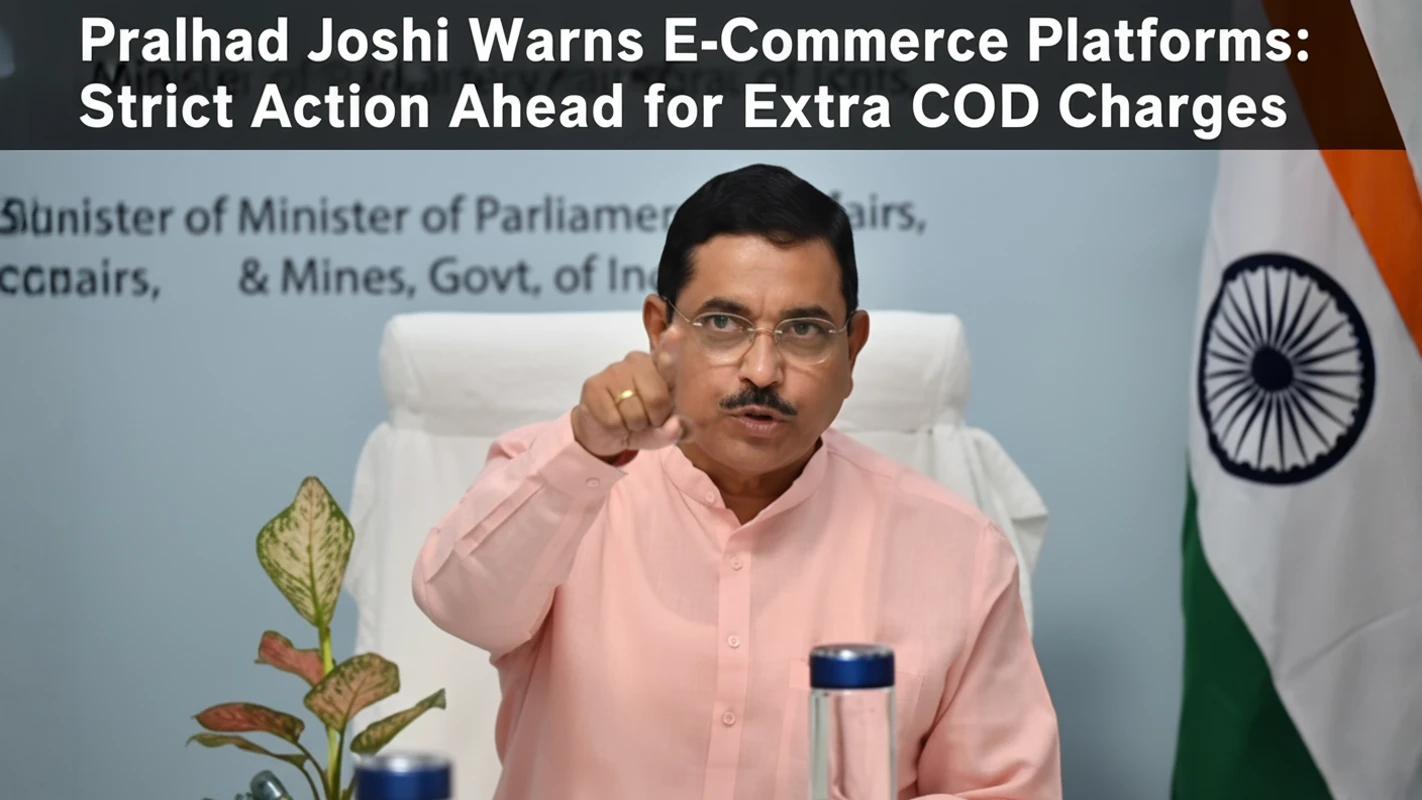In a significant move that could reshape India’s booming e-commerce industry, Union Minister Prahlad Joshi has promised strict action against online marketplaces found charging extra fees for cash-on-delivery (COD) orders. This statement comes as a relief for millions of Indian consumers who frequently opt for COD, particularly in smaller towns and semi-urban areas where digital payments still face barriers.
The Problem with COD Charges
Over the past few years, several e-commerce platforms have quietly introduced additional fees for COD transactions. While companies often justify these charges as “handling” or “convenience” fees, critics argue that such practices are exploitative and discriminatory against consumers who either do not have access to digital payment infrastructure or simply prefer the assurance of paying after receiving their goods.
With the popularity of COD in India—accounting for nearly 60% of online retail payments in certain segments—these extra charges have sparked public outrage and raised questions about fair pricing.
Minister’s Stern Warning
Union Minister Prahlad Joshi’s remarks underscore the government’s intent to hold platforms accountable for consumer exploitation. Speaking on the issue, Joshi emphasized that the government will not tolerate unfair trade practices in the digital commerce sector. “E-commerce companies must operate with transparency and fairness. Charging extra money for COD is unacceptable, and action will be taken against violators,” he stated.

This warning aligns with the government’s broader regulatory push to ensure that the digital economy, while growing rapidly, does not compromise consumer rights.
Why COD Still Matters in India
India’s digital payments ecosystem has grown exponentially in recent years, thanks to UPI, mobile wallets, and widespread internet access. However, cash-on-delivery remains deeply entrenched for several reasons:
-
- Trust Factor: Many consumers prefer COD as it allows them to check the product before parting with their money.
-
- Digital Divide: Not every Indian household has reliable access to smartphones, internet, or digital literacy.
-
- Payment Failures: Instances of technical glitches and failed transactions often push customers towards COD as a safer option.
-
- Rural Dependence: In semi-urban and rural India, where banking penetration is still uneven, COD continues to dominate.
Given these realities, penalizing customers for choosing COD is seen as discriminatory, and the government’s stance is likely to resonate strongly with citizens.
The Regulatory Landscape
The warning also fits within the government’s ongoing efforts to regulate e-commerce giants more stringently. Earlier, authorities raised concerns over deep discounting, preferential listings, and unfair treatment of small sellers on large platforms. Now, the focus is expanding to consumer charges and payment practices.
The Ministry of Consumer Affairs has already signaled that it will keep a close watch on hidden charges and misleading pricing strategies. By targeting COD fees, the government aims to promote transparency and fairness in online retail transactions.
Industry Reactions
Industry insiders are divided on the issue. While consumer advocacy groups have welcomed Prahlad Joshi’s remarks, arguing that COD fees exploit vulnerable customers, some e-commerce players insist that these charges are necessary to cover the additional costs and risks associated with handling cash.
A senior executive from a major platform, speaking on condition of anonymity, explained, “Cash-on-delivery involves higher logistics costs, delays in settlements, and a higher rate of returns compared to prepaid orders. Platforms charge these fees to recover operational expenses.”
However, critics argue that these costs should be factored into overall business models rather than being selectively passed to COD customers.
What This Means for Consumers
If the government follows through with regulatory enforcement, e-commerce firms will be required to eliminate COD surcharges. This could lead to:
-
- Lower purchase costs for customers opting for cash payments.
-
- Greater trust in online shopping, especially among first-time buyers from Tier-2 and Tier-3 cities.
-
- Increased consumer protection, ensuring fair treatment regardless of payment mode.
At the same time, platforms may need to find alternative ways to manage the higher operational costs of COD, possibly through better logistics efficiencies or improved digital adoption strategies.
Looking Ahead
Prahlad Joshi’s warning signals a new phase of accountability for e-commerce companies in India. As the digital marketplace expands rapidly, balancing innovation with consumer rights will be critical. By targeting unfair COD fees, the government is not only addressing an immediate grievance but also sending a clear message: the customer’s interest comes first.
The coming months will reveal how e-commerce giants respond to this directive—whether they comply voluntarily or await stricter enforcement measures. Either way, this development marks a pivotal moment in the evolving relationship between regulators, businesses, and consumers in India’s digital economy.
Disclaimer: This article is based on information available from public sources. It has not been reported by EQMint journalists. EQMint has compiled and presented the content for informational purposes only and does not guarantee its accuracy or completeness. Readers are advised to verify details independently before relying on them.



